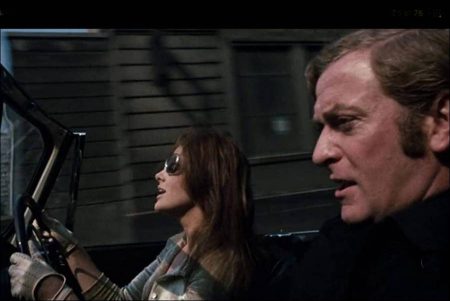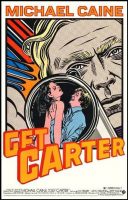Taglines: The original gangster is back.
Get Carter movie storyline. Sir Michael Caine is Jack Carter, a small-time hood working in London for the Fletcher brothers when word reaches him of his brother’s death in Newcastle under suspicious circumstances. So, Carter leaves London for his home city of Newcastle to arrange his brother’s funeral. While preparing for the burial, he becomes obsessed with learning who murdered his sibling and why.
Refusing to accept the police report of suicide, Carter seeks out his brother’s friends and acquaintances, Carter tries to question them but finds a wall of stony silence from the local underworld. Operating on a hunch, he follows sleazy chauffeur Eric (Ian Hendry) to local crime lord Kinnear’s (John Osborne) home and is surprised to find himself more than welcome.
Before he leaves, Carter is warned to return to London before he causes any trouble. He ignores the warning, and soon attempts are made on his life. After a narrow escape, he is rescued by Kinnear’s girlfriend, Glenda (Geraldine Moffat), and she takes him to her place. The pair make love, and, afterwards, while Glenda is out of the room, Carter discovers a porn film starring, among others, his brother’s young daughter. Carter then sets out on a path of vengeance against those implicated in his brother’s death, and the film proceeds towards its downcast ending.
Get Carter is a 1971 British crime film written and directed by Mike Hodges in his directorial debut and starring Michael Caine, Ian Hendry, John Osborne, Britt Ekland and Bryan Mosley. Based on Ted Lewis’s 1970 novel Jack’s Return Home, the film follows the eponymous Jack Carter (Caine), a London gangster who returns to his hometown in North East England to learn about his brother’s supposedly accidental death. Suspecting foul play, and with vengeance on his mind, he investigates and interrogates, regaining a feel for the city and its hardened-criminal element.
Producer Michael Klinger optioned Lewis’s novel shortly after its publication and made a deal with the ailing Metro-Goldwyn-Mayer (MGM) to finance and release the film, making Get Carter the last project to be approved by the studio’s Borehamwood division before its closure. The production went from novel to finished film in eight months, with principal photography taking place from July to September of 1970 in and around Newcastle upon Tyne, Gateshead and County Durham.
Hodges, Klinger and Caine intended to create a more realistic portrayal of violence and criminal behaviour than had previously been seen in British films: Caine, who also served as an uncredited co-producer, incorporated aspects of criminal acquaintances into his characterisation of Carter, while Hodges conducted research into the criminal underworld of Newcastle (in particular the one-armed bandit murder). Cinematographer Wolfgang Suschitzky worked with Hodges to give scenes a naturalistic feel, drawing heavily on their backgrounds in documentary films.
Get Carter turned a respectable profit upon its initial UK release. It attracted mixed reviews, with critics begrudgingly appreciating the film’s technical achievements while criticizing the complex plot, violence and amorality, in particular Carter’s apparent lack of remorse at his actions. American critics were generally more enthusiastic, but the film languished on the drive-in circuit, while MGM focused its resources on producing Hit Man, a blaxploitation-themed adaptation of the novel.
Get Carter (1971)
Directed by: Mike Hodges
Starring: Michael Caine, Ian Hendry, John Osborne, Britt Ekland, Tony Beckley, George Sewell, Geraldine Moffat, Dorothy White, Rosemarie Dunham, Petra Markham, Alun Armstrong, Bryan Mosley
Screenplay by: Mike Hodges
Production Design by:
Cinematography by: Wolfgang Suschitzky
Film Editing by: John Trumper
Costume Design by: Evangeline Harrison
Art Direction by: Roger King
Music by: Roy Budd
MPAA Rating: None.
Distributed by: MGM-EMI Distributors
Release Date: February 3, 1971 (Los Angeles), March 10, 1971 (United Kingdom)
Visits: 279

